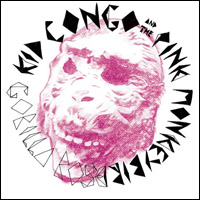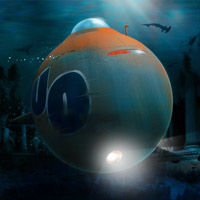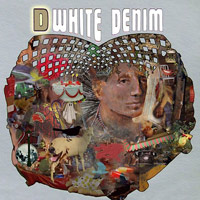
Gorilla Rose
In the Red
Storied careers beget a certain amount of street cred which allows certain artists—in this case Kid Congo Powers—to make albums without being brought up on charges of becoming complacent. With his most recent effort, Gorilla Rose, Powers, along with the Pink Monkey Birds, has given the word a brand new definition.
However legendary his status may be—whether it be for his time as a guitar wielder for Nick Cave or his stint with the Cramps—there is no excuse for the lackadaisical recording presented here. Though the instrumental element of Gorilla Rose is a solid background, pushing driving, bluesy Stooges riffs over strange South American themes, Powers overpowers the positives with corny spoken-word stories. From the Screamin’ Jay Hawkins angled “Bo Bo Boogaloo” to the half-baked Birthday Party C-side “Injun War Crimes,” Kid Congo almost dares you to take him seriously for 40 uninspired minutes. The mixture of clean instruments and dirty vocals makes the entire album reek of something that was thrown together at the last minute. The only track that comes even close to saving this is “Goldin Browne,” which Powers actually leaves alone long enough to let the music speak for itself. Powers wants this album to be an homage to the real Gorilla Rose, who was a staple in the LA punk scene in the ’70s, but instead presents something akin to a Tuesday night poetry slam.
But however harsh this review may be, it doesn’t even come close to the cringe-inducing words that Kid Congo passes off as lyrics. He tries to be clever and amusing, but instead comes off sounding like a badly conceived parody of the aforementioned Nick Cave. Though he probably won’t get too much of a reprimand for what he’s brought here, Powers at least deserves a stern talking to about why just because you can do something, doesn’t mean that you should.
Terrence Adams

Rock & Roll Submarine
UO
One could be forgiven for questioning the viability of a new Urge Overkill record arriving nearly two decades after the band’s prime. It’s worth remembering, though, that in the early to mid-90s UO were the safe money in the Next-Big-Thing alt-rock sweepstakes. Bringing an ironic sense of lounge lizard swagger and glammy excess to Chicago’s occasionally thick-necked hard-rock underground, the band had genuine crossover appeal, which would eventually peak with the album Saturation and an appearance on the Pulp Fiction soundtrack. Those, to quote a wise man, were different times.
It’s been 16 years since the band’s last album, 1995’s less than monumental Exit the Dragon. But the recent resurrections of any number of seemingly long forgotten indie bands have paved the way for Rock & Roll Submarine. And who better to embrace a rock cliche than Urge Overkill? Holding firm to the template of FM-radio riffs, punk muscle and glitter-rock choruses that almost brought them stardom, the band—comprising OGs Eddie “King” Roeser and Nash Kato, along with former Gaza Strippers guitarist Mike “Hadji” Hodgkiss and Brian “Bonn” Quast of the Cherry Valence—sound as tight, tough and catchy as one could hope for. Tracks like the first single, “Effigy,” and lead-off track “Mason/Dixon” could slide comfortably onto Supersonic Storybook and are good reminders of Urge Overkill’s knack for well-written melodies, while “Poison Flower” and “Touch to a Cut” hint at the darker themes that can’t help but slip past the defenses of a band for whom indulgence wasn’t merely a stage prop.
It’s difficult to see where this album fits into the current musical landscape; it’s certainly not going to win over a younger generation of fans, but it is by no means an embarrassing attempt at relevance. For as much as Urge Overkill took a tongue-and-cheek view of rock & roll convention, it was also their bread and butter. And really, what else are they going to do? It’s not as if Nash and King have civil engineering degrees. Here’s to hoping Guyville is still buying.
Nate Knaebel
MP3: “Effigy”

D
Downtown
Maybe it shouldn’t come as too much of a surprise that much of D, White Denim’s fifth full-length release, sounds like a millennial take on the Meat Puppets. The Austin band, which began as a trio, has honed its aggressive garage rock sound over the years, and with the recent addition of a second guitarist, seems to have solidified its brand of psychedelic rock while also shoring up its live unit. And one glance at the track listing, which includes a song called “Drug,” will let you know that White Denim and the Meat Puppets have drawn form the same well.
The album’s tone is set with the frantic, but breezy, psychedelic rocker, “It’s Him!” “Burnished” picks up on a similar note, but heads in a more exotic direction with an extended jam that takes on an almost Indian feel that segues directly into the groovy and trippy “At The Farm,” an instrumental tour de force that’s one of D’s highlights. Everything comes together with “Is and Is and Is,” a dynamic track that alternates between whispered verses and soaring, screamed choruses. By the time the countrified album closer “Keys” hits, White Denim have made a convincing case for themselves.
Ron Wadlinger

Noise of Welcome
All Hands Electric
With all the recent Dylan birthday hubbub, it’s hard when listening to any artist working in the general folk-rock realm not to be reminded of the reach that Mr. Zimmerman’s music still has 50 years after he first stepped foot on a Greenwich Village stage. Zachary Cale hangs his hat down by the ol’ Gowanus in Brooklyn, and he might be considered what was once called a “new Dylan,” were that label not already a generation or two past its expiration date. Besides, there’s much more going on with Cale’s latest and third album, Noise of Welcome, than just merely talkin’ New York blues.
Indeed, following a short instrumental into, Noise begins with a drowsy pop number, “Blake’s Way,” built up from Cale’s dexterous fingerpicking. Piano notes and tapped snare, along with Alfra Martini’s backing croon, meld to back Cale’s vocals, which do have a little Dylan in there somewhere. Cale actually reminds me most of Adrian Crowley, particularly when he stares into the darkness on the haunting “Hello Oblivion” or when he casts a shadow over the appropriately named instrumental “Nocturne in G Minor.” But it is the empathetic quality of his vocals and the natural mannerisms (read timeless) which fleck each song that gives the record distinction. Cale, like most, hasn’t been able to escape influence completely, but as Noise of Welcome proves, there’s still a lot of good that can be had from it.
Stephen Slaybaugh
MP3: “Hello Oblivion”

Tara Jane O’Neil and Nikaido Kazumi
K
Tara Jane O’Neil’s new album, a self-titled collaboration with Japanese artist Nikaido Kazumi, is quite a departure from her last record, A Ways Away. Maybe the whole singer-songwriter thing just wasn’t doing it for O’Neil anymore, but regardless the reason, she’s pretty much ditched the whole “song” part on this record in favor of freaky freeform improvisation. At least, I hope its improvisation, because actually writing this stuff would be a gargantuan feat. I’m hard pressed to call these tracks “songs” as well, as they’re more like collages of impulse-driven musicianship. There are clicks and clanks and jingles and weird melodies mixed with some of TJO’s ghostly guitar winding in and out. The art aspect of the record—art music, I should say—isn’t all that out of character for O’Neil as she’s had plenty of renown for her visual work and that correlation is vividly clear here. These tracks are just as haunting and distant sounding as some of her visual work looks. The record’s actually an experiment in working “without shared language” (O’Neil doesn’t speak Japanese and Kazumi doesn’t speak English), and as such it works as a surprisingly engaging exercise in the musical dialect. I’m not going to lie, though, there was a point when I had the record on in the background and I thought I heard my cat being attacked outside the apartment, only to realize it’d come from the speakers. Talk about visceral response: my heart was going crazy after that. But don’t worry, it’s not all freaky squealing. At times it sounds like something you’d watch performed in an art gallery. At others, it resembles Animal Collective sans all the fancy equipment and expensive hoodies. The collaboration has produced a minimalist art record that’s worth giving a whirl.
Michael P. O’Shaughnessy
ALBUM REVIEWS
D. Charles Speer & the Helix, Leaving the Commonwealth
Nodzzz, Innings
Danger Mouse and Daniele Luppi, Rome
Bachelorette, Bachelorette
The Antlers, Burst Apart
Okkervil River, I Am Very Far
Yael Naim, She Was a Boy
The Cars, Move Like This
Lee "Scratch" Perry, Rise Again
Beastie Boys, Hot Sauce Committee Part Two
Fleet Foxes, Helplessness Blues
Gruff Rhys, Hotel Shampoo
Cat's Eyes, Cat's Eyes
Explosions in the Sky, Take Care, Take Care, Take Care
